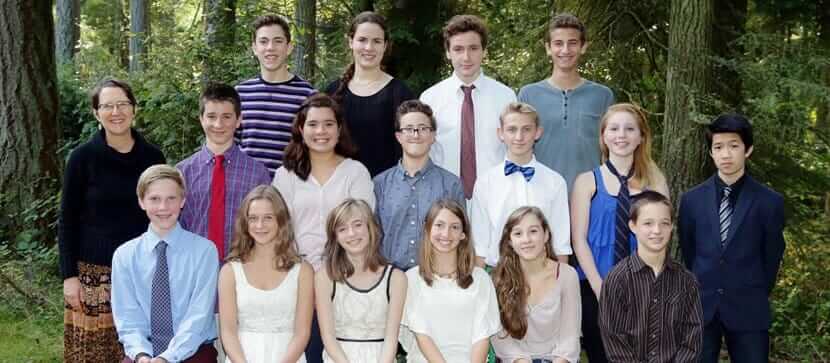Karol White teaches eighth grade at the Whidbey Island Waldorf School on the Chinook land, with a cohort of students that she’s been with since they were in first grade. She’ll be retiring at the end of this year, and she recently took time to reflect with me on what this land has meant to her and her students over the years.
“I step out into this forest,” she said, “and nature holds me. The rich curriculum and this place, which is so incredible—they marry together to present for the child an incredible experience as they grow and develop. It’s beyond words. It is such a gift for all of our students to experience those two things.”
Karol explained how work on the land mirrors work in the classroom, sharing examples from the third grade curriculum. Awareness of mortality and the reality of death is part of a child’s development around age 9 or 10, she said. “There’s a beautiful innocence, and then this shocking revelation. That’s when we have our garden curriculum. Taking them out in nature, letting them see how things grow and wither, helps the child feel secure. Seeds fall. Life goes on. Death is beautiful, and a part of life.” Karol said she’s been able to share the incredible experience of gardening with Cary Peterson and Maggie Mahle, who she described as having an “infectious” love and care for the land. “They love it, and the children feel it and love it too.”
In fifth grade, Karol explained, children experience a golden age of childhood. “They encounter the totality of things, and they’re really in balance—even in muscular and physical capacities. They’re open to other ways of thinking. We introduce Hinduism and Buddhism, we study Persia, we go deeply into the mythology of culture. They gain a very global sense of being a citizen.” Karol said that she loves how the Whidbey Institute has the same theme, of global citizenship. “When they come on this land, they see [at the Institute], as in the classroom, a continuation of the theme that we are all one. There are so many incredible ways in which we are walking hand in hand.”
Karol said that she sees the advantages of being in the forest for the children’s development, and that trimming trails, working the garden, studying botany on the land, and walking the interpretive wetland trail have enriched her students’ experiences. Even in the classroom, the forest is with them. “We have huge posts in the rooms—Ross Chapin designed the building. The forest feels like it comes into the school.”
“When my students were young, we did eurythmy—movement to music or speech—in the Sanctuary,” Karol said. The character of the structure enriched the experience for all of them, she explained. “You really notice the sacredness of the space. In eurythmy, you need a sense of where you are in the whole thing, and where everyone else is, to move with a oneness. It’s a ‘point and periphery’ consciousness you’re trying to build—‘I’m just one thing, in this grand thing, and I have a responsibility.’ The wonder that the sanctuary creates—walking in the door, it’s really palpable. To get there, we walk through the forest, in silence, welcoming the birds to speak.”
Karol’s retirement is tinged with nostalgia, as she’s spent over 20 years working with students on and around this land. “In reflecting on what this land, these children, and this school have meant to me, I’m filled with appreciation. In the routine of our daily lives, it’s rare that we stop and take a look at what the full picture has been.” Facing the challenge of a thyroid tumor with courage and optimism, Karol admits that being with her students is a healing experience. “My class gives me medicine for my soul. The land does, too. After work, I come out and walk the trails. I love Granny’s trail, with the bridge. I go on that one, and come up through the Wetland trail. You feel the vivaciousness of the land—that etheric energy is alive there, and it feeds me.”

